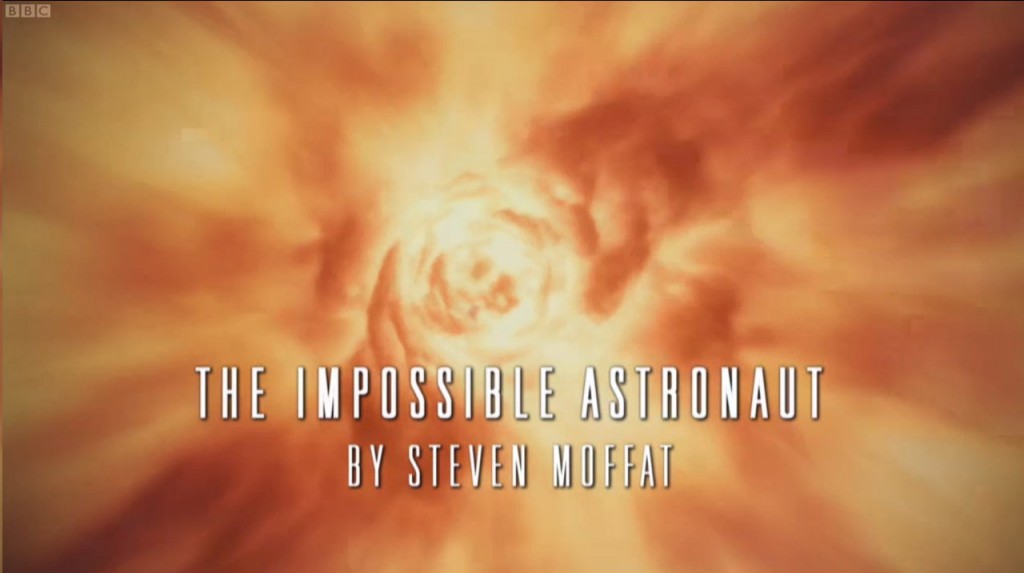
Spike Marshall: Doctor Who is something of an oddity in that in its newest incarnation it’s both utterly guarded of its future plot points and beholden to a national level of popularity which makes those future plot points a marketing gimmick. Whilst RTD and Moffat would take increasingly drastic measures to ensure that no spoilers were released to the general public their efforts were often scuppered by the culture at large. Eccleston regenerating at the end of the first season of the revitalised show should have been something of a shock.
However about a quarter of the way into the season the BBC released a press statement pretty much stating that Eccleston and Doctor Who had parted ways. Similarly a cliff-hanger revolving around the regeneration of the Doctor at the end of the fourth season was neutered somewhat by the fact that show runner RTD and the then Doctor, David Tennant, had agreed to a year of special episodes building up to the Doctor’s death. As such when last weeks issue of the Radio Times grimly stated that one of the four central characters in the show would die it was hard not to look at the recently released trailers and see if you could spot poor old Rory in any footage that wasn’t from the first episode.
As it turns out the major death was actually fairly unexpected, but rendered perhaps a little inert by the fact that people were waiting for something…anything…to happen to Rory. The Doctor calmly meeting his end at the hands of a mysterious, space-suit clad, visitor should have been academic. A show is not going to kill off its major star and Matt Smith definitely isn’t regenerating anytime soon. as such when the Doctor was initially shot and became all aglow I was trying to work out what the solution to the problem would be. The second shot, halfway through his regeneration cycle, which finished off the Doctor for good was a genuine shock. Even though I knew there was no way they could have permanently killed off The Doctor the vague brutality of that second shot and the reaction of his assembled companions really sold the moment. It’s at that point I realised how much I had come to like the current crew of the Tardis.
So, gang, to kick things off. What did you make of the Future Doctor’s sudden departure?
Adam P: Yeah, it affected me just a little. I mean, when you think about it for five seconds you realize that it has to be reversed, but it was clever of Moffat to have the murdered Doctor be 200 years older than “our” Doctor, since that makes it sort of vaguely plausible that they’d kill him off. Or, well, not really, but you can believe it just long enough to go “Oh my gosh!”
It’s weird–I often don’t connect to Doctor Who on a first go-round. I like last season a lot, but it didn’t really “click” for me until I rewatched it later, when I was prepared to put aside the baggage from Russell T. Davies’ run. Even the much-heralded Christmas special didn’t really do it for me. But this did. Maybe it’s because I love seeing the Doctor surrounded by lots of characters, which gives the sense that the show is grounded in some kind of ongoing reality rather than just being a string of episodes. Maybe it’s because they pulled off some well-done emotional scenes without being mawkish (which is an ongoing problem with this show). Maybe it’s because Stetsons are cool.
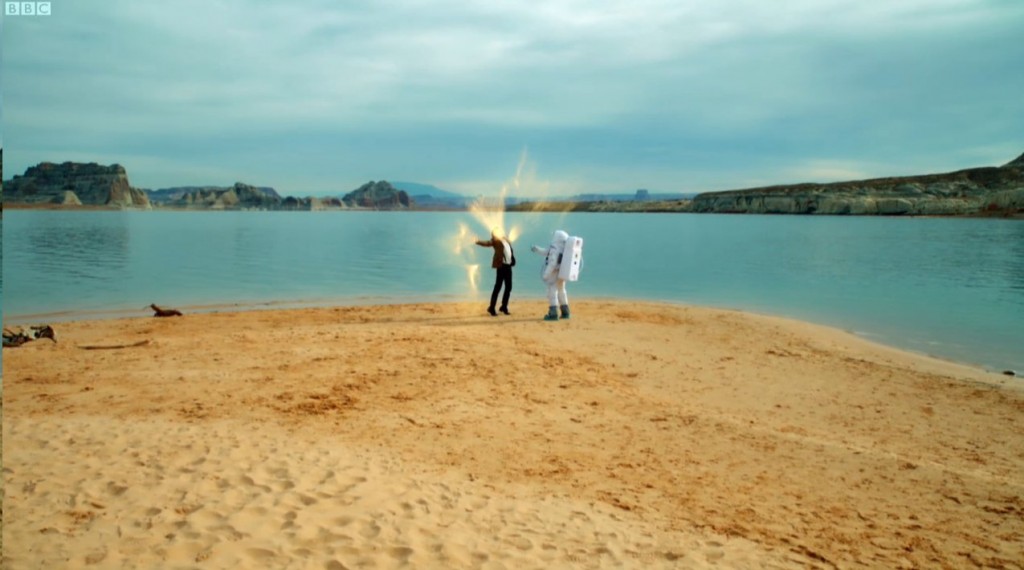
Spike: I definitely agree, I’ve always preferred to see the Doctor surrounded by people. It’s nice to have a bustling Tardis, largely because the show can easily fall into the trap of having the Doctor be smug and all knowing and the companion be wide eyed and mystified at sci-fi stuff. It’s why I like the Jack Harkness/River Song dynamic of a future companion. It’s nice to have someone who’s a little savvy in the TARDIS.
Ian Pratt: That was actually one of my favourite aspects of the episode. It was a lot of fun seeing people who not too long ago were walking around the TARDIS slack-jawed acting like they’ve been waltzing through time all their lives now alongside a newbie. As for the Doctor’s sudden departure, maybe I wasn’t fully settled back in yet, but I can’t say it particularly shocked or moved me. That’s not to say it wasn’t an effective scene… it’s just hard for someone who’s watched as much episodic TV as me to be too concerned by a shock shooting or something, especially considering the amorphous, shifting nature of Doctor Who.
Overall, I feel a little conflicted on this season’s opener. There’s so much to like about it, from the epic canvas to the ever-brilliant cinematography and, of course, the immediate thrill of simply watching Matt Smith bounce around again. However, the sheer urgency of “The Impossible Astronaut” made it a little hard for me to truly settle in. Obviously it’s a sticky issue comparing a stand-alone episode to a cliffhanger ending like this one, but I felt “The Eleventh Hour” was a superior opener. Granted, I’m a little biased towards Season Five’s inaugural entry as it proved to be my gateway into the show, although I feel there’s genuinely more to it than that. I respect Moffat’s bravery in not simply plumping for more of the same and going the Villain of the Week route to get everyone nice and cosy again. It just would’ve been nice to get the same kind of visceral impact here that we did last time out to kick things off. It’s a fine episode, to be sure. I just can’t help wondering if pole position was really the place for it.
Kristina D: I went into this knowing that a main character would bite it, but since I’d seen all of the main players extensively throughout the series trailer, I didn’t put any stock into The Doctor’s demise. The final blast to his chest as he was regenerating did make me flinch, but the problem with that scene is that every single one of these people has died at some point, yet the deaths are never permanent. Death loses all poignancy once it’s been cheated over and over.
Spike: To be honest I kind of view this episode as a statement of intent for this season, it seems like Season Six is going to be far more serialised in general and I think this episode is pretty much laying the groundwork for what is going to happen. As such I’m inclined to not really judge the episode until both parts are done. However I do feel that the opening ten minutes were perhaps a little too bewildering. The sudden rush of information was a little too much at times and it doesn’t help that we really don’t know what the significance of certain things were. Like I’m still not sure what the deal with the Doctor trying to get Amy and Rory’s attention was about. It was either something which is fundamental to the plot, or it was a throwaway joke about the Doctor’s wacky adventures, but the show was so vague it was hard to tell.
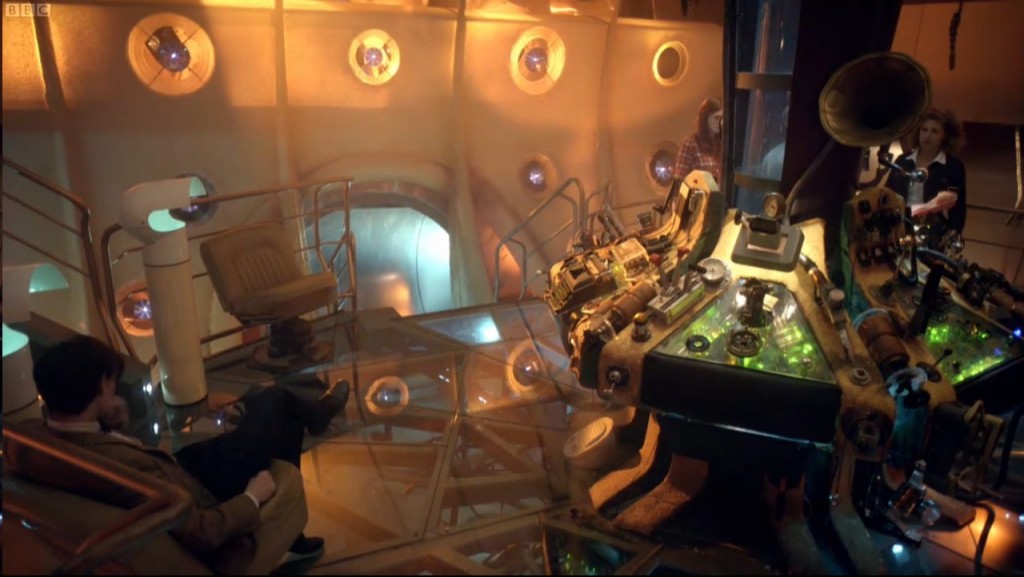
Adam: I think Stephen Moffat is a guy with a lot of ideas, and sometimes he tries to cram in so many ideas that he gives some of them short shrift, or leaves them as vestigal little plot bumps. I think that was one of the latter. But then, the Smith series has really played up the idea that the Doctor has been everywhere and knows everybody and has done everything, so it’s hardly out of line. We’ve even seen the Doctor edit himself into movies before. Twice.
Can I mention one of my favourite things about the episode? I’m Canadian, but we get so much American culture up here that we sort of feel like Americans by default, so it’s always entertaining to get someone else’s depiction of the States. There was a discussion I was having elsewhere about how Doctor Who is quintessentially British, but it’s not self-aware about it–the writers don’t usually set out to capture a snapshot of British society and culture, they just provide one by default, the way that a lot of old movies and TV shows and comic books do. But here they were obviously trying to do their “love letter to America” episode, and it’s obviously all about what a Brit thinks America is like–all vast deserts and stetsons and Richard Nixon and moon landings. And guns. Lots and lots of guns.
Ian: Guns that make that PYOOM PYOOM sound from The Quick and the Dead and Back to the Future Part III when fired.
Spike: I love that the Doctor when presented with the President of the United State and his heavily armed security was able to dictate terms to them based purely on what he knew. It’s a perfect embodiment of how Doctor Who almost deifies intellect above brute force.
Adam: If I’m perfectly honest, I think Doctor Who threats have a bad habit of standing and staring at the Doctor until he outwits them or out-talks them, instead of just shooting already.
Spike: But that’s the nature of TV. It’s why people on 24 are still surprised when Jack Baeur resorts to torture. But yeah, I get your point. It does seem like the show has a habit of setting up strawman villains who are very reasonable and open to debate. It’s like if BioWare suddenly made a TV show.
Ian: I think I see where you’re coming from about the villains as well, Adam, but I honestly think Spike nailed it – that’s the nature not just of TV but the Doctor himself. In fact, the scene in the Oval Office actually typified it. Who knows what the ramifications of shooting/ gouging/ whatever the Doctor might be? The hesitancy on those suits’ faces said it all. It actually reminds me of times from last season when the Doctor bluffed his way out of bother by spinning just that sense of mystery and fear to his advantage.
Adam: Honestly it wasn’t too bad here–I can buy the SS not just opening fire in the Oval Office–but you have to admit, it happens a lot on this show. The Daleks don’t seem as frightening as they ought to, because they’re always chatting with the Doctor ad nauseum instead of just blowing him away like the warlike automatons they’re supposed to be. But it’s a minor nitpick.
Another example was The Silence–that’s what the forget-me-not critters are supposed to be called, right?–in the bathroom with Amy. Though again, it might not have just been there to kill people, it seemed to want to send a message. Good idea for a monster, though they were slightly rehashing the Weeping Angels.
Ian: My first thought upon seeing them was “The Gentlemen from Buffy by way of Giger.” Which in itself is no bad thing, I suppose, especially when they’re not above ripping people apart in gooey fashion at 6PM on a Saturday night.
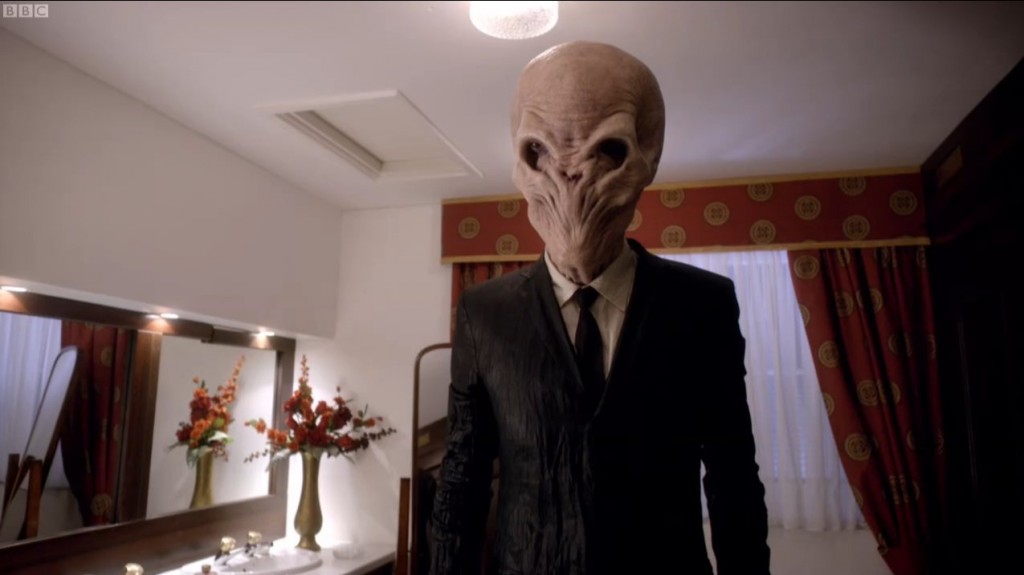
Kristina: Yeah, I was not expecting the Silent to pull a Dr. Manhattan on that woman in the bathroom. It’s interesting to see the difference between what is acceptable for children’s programming in the UK versus the States. You will never see Elmo explode into a bloody puddle on Sesame Street. The Silents are a legitimate threat, as opposed to some of the monsters in The Doctor’s rogues gallery that feel too cartoonish for me to take seriously.
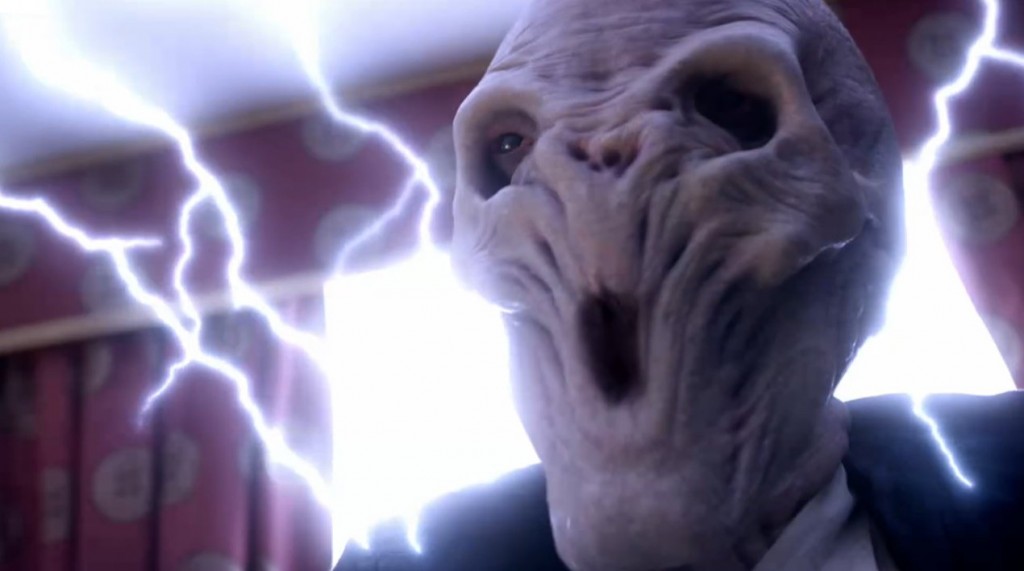
Spike: I loved the Silents, I really did. Everything about them was just surprisingly creepy. Although I did think the stuff about their victims forgetting them when not looking directly at them was a bit of a rehash. It seems to me that Moffat has a particular set of ideas and he keeps going back to those ideas and creating new permeatations on them. I don’t have as much of a problem with that as some, although I get why people might have rolled their eyes at them. The thing that gets me about Moffat’s creations is that he seems to have an instinctive idea about what will scare children. The Angels and The Silents and the Cracks are all things which almost feel like they were birthed from schoolground games.
Adam: I think if they hadn’t made such a big deal about how it’s important to keep your eyes on them, they wouldn’t have felt so Weeping Angel-ish. But it makes sense, you’re not going to forget something until you look away. Question: are these guys the Big Bad from last season’s finale? “Silence Will Fall”?
Kristina: I have to say that I was unhappy with the revelation of Amy’s pregnancy. Having had time to think on it, I truly believe that things are not as they seem. I’m unsure if Karen Gillan’s cries of pregnancy pain during the final few minutes were meant to be taken seriously, but pregnant women do not go into painful hysterics over a wee bit of running. She had barely moved before she was doubled over. It is also implied, at least to me, that the Silent in the bathroom wanted her to inform The Doctor of her pregnancy. Why? And why hasn’t she told Rory? Moffat is aces at presenting anidea that turns into something else entirely, so I’m hopeful that my theory of The Silents using this “pregnancy” as a means of planting seeds of distrust among Team TARDIS, a la the Horcrux necklace from Deathly Hallows, is correct. I’d hate for Gillan’s time with the show to end on such a bleh note as “Well, I’m knocked up! Bye!”
Ian: I’d hate for Gillan’s time on the show to end full-stop. Her arc last season wasn’t the flashiest of the bunch, but it was engrossing from start to finish. She really sold me on the “impressionable young girl” aspect of Amy, swept up by all the wonder around her and a bit too selfish and immature for her (and Rory’s) own good some of the time, yet her comic timing and vulnerability in the meatier plot points kept her likable. Seeing how Gillan and Arthur Darvill – my favourite of all the principals – develop as a couple is one of the things I’ve been most looking forward to.
Whether it proves to be the case or not, Amy’s revelation was totally telegraphed for me. I can see how Moffat might have felt audiences wouldn’t see it coming. Maybe he trusted the ongoing “paradox shmaradox, let’s just save the Doctor” argument between Amy and River to create uncertainty in the minds of viewers, but I was literally saying “preggo” out loud long before Amy finally spoke up. It’s not really a big deal at the pace the episode was moving and, again, it could have been intentional to tip the hand early considering all the youthful motifs in the episode (like the kid talking right before Amy’s revelation and the Doctor’s “go make babies” quip.) That said, I’m a bit fussy about stuff like that. I like my TV surprises to be surprises and it kind of annoys me when I’m able to see beats like that round the corner.
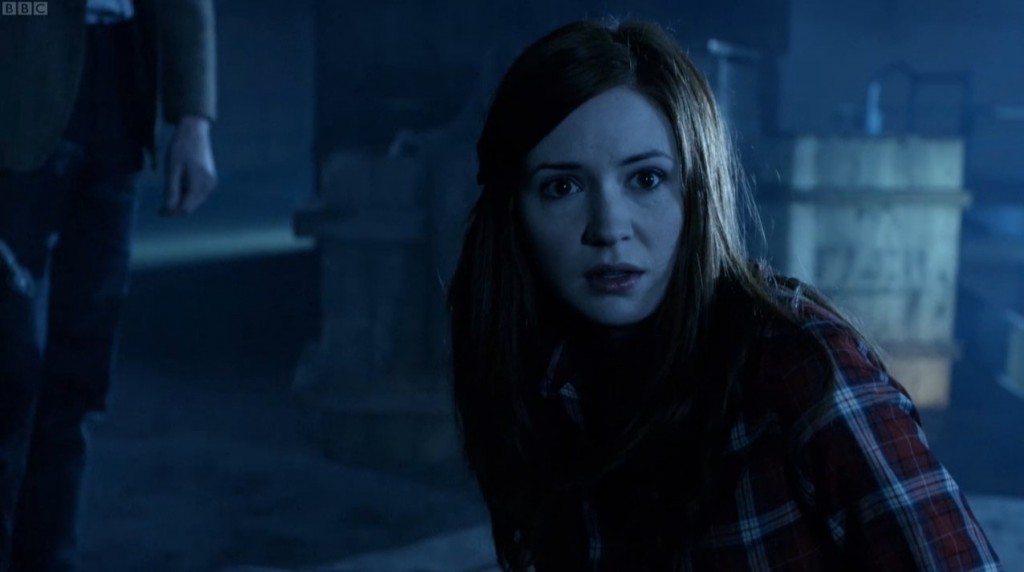
Adam: Yes, the Amy pregnancy thing was the one bit I truly disliked here. Not so much the fact that she’s pregnant but the fact that they seemed to think this is some astonishing twist–my gosh, a newly married woman is pregnant? That NEVER happens!–and the fact that she chose the least convenient time to announce it. It really adds fuel to the fire of people complaining that Doctor Who has been getting too soap-opera-ish. And why was it urgent to tell everyone in the middle of a showdown? And unless she only just realized it, why would she be stupid enough to go on a dangerous mission while pregnant? And unless they’re planning on sidelining Amy, how are they going to allow her to keep running around and getting almost killed and exposed to all kinds of dangerous time-space radiation (the WORST KIND of radiation)?
Ben Appleby: First off, this was a pretty dramatic shift from previous season openers, wasn’t it? We’ve always had a relatively light, standalone story before, and this time Moffat’s hit the ground running, throwing bewildering amounts of plot at the audience. I’m not complaining, and the standard was certainly very high, but wasn’t this meant to be the story that drew previously untapped US audiences into the show? Because if so, I have to wonder how they reacted to something quite so continuity-heavy, even with the extra opening narration I’m told the broadcast over there had. The River Song plotline alone’s got several years behind it now, and recognising that ship from The Lodger, for instance, would be tricky for the casual viewer.
Anyway, that aside, I again noticed what a fantastic comic pairing Moffat’s writing and Smith are this episode (as well as the performances of the others, of course- Arthur Darvill especially). Lines like the Easter Island reference, Mrs Robinson, “This is my normal face” “I know”- in both this and the past Christmas special the show’s been on rare comic form, and I hope to see it continue.
Now, I kind of doubt Amy’s pregnancy is going to be just that, given Moffat’s long, proud record of utterly wrong-footing the audience- have we ever had a plot point in one of his stories that was as straightforward as it seemed to be?
Also, count me in on being impressed by The Silent as much as everyone else. They’re a bit reminiscent of Buffy’s Gentlemen, yes, but also a very nice, creepy take on the traditional Greys, which are something the show’s never delved into before. I suspect that aspect and Nevada will play into something relating to conspiracy theory and Area 51 next episode (and yes, that’s pure guesswork on my part).
I think this is also the first story when the whole River Song plot (and Kingston’s performance) really clicked for me- her moment with Rory finally nailed the direction the character’s going in, and she’s showing definite signs of growing less irritatingly self-assured just as the Doctor gets more confident around her. I know she’s been a very divisive character (and not without reason)- what did other people think of her in this episode?
Spike: I wasn’t particularly fond of River in her first appearance, but I really warmed to her in the Fifth Season and really appreciated the pathos the character was given here. It was also nice to see her and Rory interacting not only because it gave Rory something to do, but it was interesting seeing River when she didn’t feel a need to impress people. Honesty isn’t something you get from her very often, so it was nice to see her being candid. I actually quite like that Rory’s role in the show seems to be the people person of the crew. He’s the person who brings warmth and compassion in a way that neither The Doctor nor Amy can.
Ben: Yeah, Rory’s really grown on me- Darvill makes him a very credible- and likeable – everyman, and probably the most effective audience identification character the show’s had in quite some time as a result. It’s nice to see a callback to the original 60s concept of the companions being normal people, swept up in the course of events rather than especially chosen by the Doctor, which has kind of fallen out of favour since.
Guest cast were strong too, this episode- nice to see Mark Sheppard continuing to expand his ludicrous repetoire.
Spike: I was amused to see Sheppard attempting an American accent. I kind of hate it when British shows attempt to do American, as the results end up feeling either insanely quaint or insanely patronising. I think The Impossible Astronaut did a serviceable job with its American setting, but a few of the accents did seem a little rough.
Ian: I felt that as well, Spike, and wasn’t honestly sure if some of it was due to the aforementioned homage at play or not. In watching it initially though, I was definitely struck by the feeling that Americans watching it must have been cringing a little. Stuff like the security chief arguing about a “clear and present danger” was essentially the opposite of the V for Vendetta movie’s portrayal of London as a hotbed for Victorian townhouses and received pronunciation.
Kristina: Sheppard sounded suspiciously like he was doing a Batman imitation during that Oval Office scene, I must admit.
Ben: Well, the show does have a long tradition of fake accents, especially (and painfully!) Daleks in Manhattan a few years back (and, in the old series, poor Nicola Bryant). Wasn’t this the first time we’ve had actual American actors? Stuart Milligan made for a credible enough Nixon, I thought.
Either way, it’s a pretty fair counterpart to the endless parade of Hollywood films where everyone English is either received pronunciation or a dreadful pastiche of Cockney.
Spike: Milligan’s Nixon kind of distracted me, partially because he looked nothing like him and partially because I couldn’t get the image of Adam Klaus out of my head. Then again my opinion may be skewed as my definitive fictional Nixon is still the vaguely psychotic disembodied head from Futurama. Still compared to the Nixon in Watchmen Milligan was fantastic, so maybe I’m just being unfair.
Ian: I think it’s as much how the characters were written as the accents of the actors playing them, to be honest. Maybe I’m being a bit too harsh – and, again, a lot of this stuff was probably intentional – but some of the Americans’ dialogue felt like it was written by Simon Gruber. Whether it was deliberate or not, the fact that it got unintentional laughs or awkward grimaces casts a question mark over how successful that was.
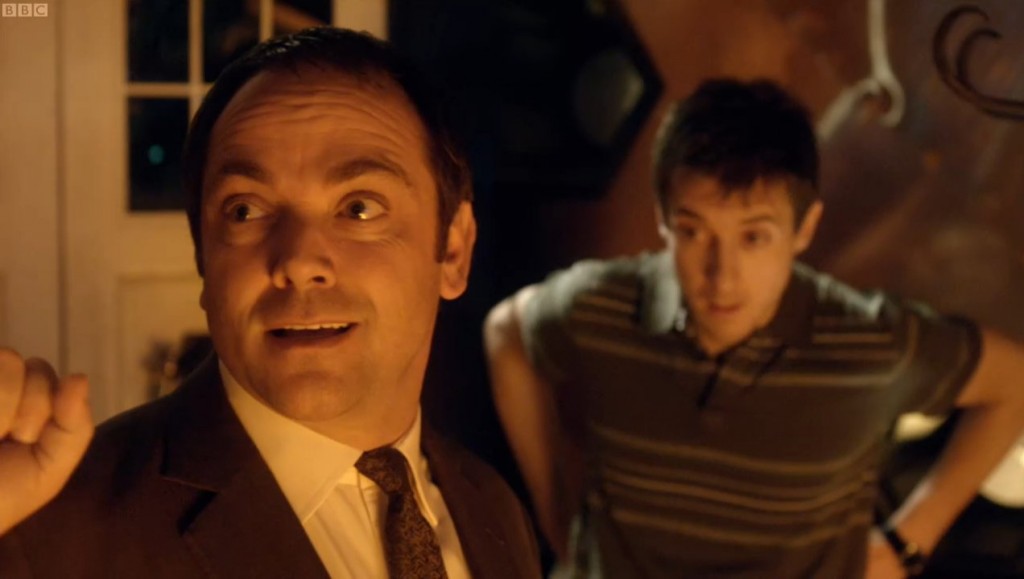
Adam: I wonder if they’re intending forMark Sheppard to be a regular cast member, and they got a Brit because Sheppard’s planning on moving back to England, but he’s in America right now, and so…um….yeah. It’s kind of weird reasoning, since you’d think the whole point of shooting in America would be to get American actors.
Casey Moore: Love Sheppard. Kind of hoping they find a reason to keep him on. Can’t wait to see who he wasn’t allowed to marry.
My favorite thing was the way they just jumped completely into the show. There was no set up this time it was just welcome to this world and hold on, which is a pretty bold and interesting way to start a season which has had as much publicity as this one. They have really been courting the American audience this time around.
Ben: It’s occurred to me that Sheppard’s planned marriage might have been the kind that’s still illegal in America, though that seems a little subtle.
Casey: I didn’t think it was too subtle. I thought it was very much a poke at J. Edgar Hoover.
Spike: Accent issues aside I did enjoy seeing Sheppard in the show, he’s pretty fantastic in whatever he pops up in and I really liked how quickly he got assimilated into the crew. So, any final thoughts on the episode before we wrap this up?
Casey: It was very much in a way like being a companion for the Doctor: just hop on and enjoy the ride and trust that end the end everything will make sense. Nice, fast paced kick off to the season(s).
Kristina: No one can accuse Steven Moffat of lacking ambition, and this season opener certainly introduced some intriguing questions which I can’t wait to see answered as the season unfolds. As a premiere, it did its job and left me hungry for whatever Moffat’s about to serve me. Just please , for the love of all that is holy, put me out of my misery and tell me who the heck River is, already!
Ian: Kristina and Casey summed it up very well there for me. It didn’t quite hit the level I was hoping for, but it’s early days yet, and I’ve every confidence in Moffat after last season. I’m already looking forward to the follow-up and seeing how far I can go before descending into non-episode related tangents about Karen Gillan.
Ben: Impressively complex and thoroughly intriguing, but I again wonder how well new audiences coped. Otherwise, though, this showcased all the strengths of the current run of the show- intricate time-travel plotting, creepy original monsters and a great balance of comedy and tension. With something that raises this many questions, of course, it all comes down to whether part two (or the rest of the season) drops the ball.